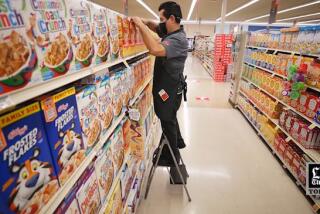1 in 15 Employees in Study Caught Stealing : Retailing: Eleven merchandisers recovered $7.3 million stolen by workers. Shoplifters accounted for about $2 million less.
Employee theft, long considered a big problem for retailers, now appears to have mushroomed to the point where workers are stealing far more merchandise than are shoplifters.
That’s the conclusion of a new poll of 11 major U.S. merchandisers. The study, by the consulting firm Jack L. Hayes International, found that nearly one in every 15 retail workers at the chains surveyed were caught stealing.
Worse yet, said the firm’s president, Jack Hayes: “You have to ask, how many people are actually caught?” Hayes estimated that retailers nab “only about 25% of those who are stealing.”
Part of the reason for the burgeoning employee-theft problem, industry experts said, is that retailers pay much more attention to catching shoplifters than to catching thieves on their own payrolls. Employees “have become more brazen because they haven’t been pursued like customers who shoplift,” said Gene McKenzie, a retailing consultant for the accounting firm Ernst & Young in New York.
For example, McKenzie said, surveillance cameras tend to be trained on the sales floor where customers are, rather than on employees working at the cash register or in the back room. Likewise, mirrors are set up to let employees watch customers rather than each other.
Employees, unlike most customers, also know how to disarm the tags many retailers now place on merchandise to trigger alarms when someone tries to sneak out the door without paying.
Advances in retailing technology, however, may be starting to curb employee theft. Jeffrey P. Luker, a retailing consultant at Arthur Andersen & Co., said electronic cash registers and other computerized inventory-tracking equipment are helping retailers pinpoint where their losses are occurring. It’s been especially useful, he said, in spotting employees who fleece their bosses by undercharging their friends at the cash register.
Previous studies have shown that retailers have generally considered employee theft only a slightly larger problem than shoplifting. They have attributed roughly 45% of their “shrinkage” to employee theft, another 40% to shoplifting and the rest largely to bookkeeping and cash register errors.
The figures in the Hayes study released Friday, however, showed that the 11 retail chains surveyed recovered $7.3 million in merchandise from employees who were caught stealing, about $2 million more than was recovered from shoplifters. Consultants said the gap probably would be far wider if retailers were as good at nabbing unscrupulous employees as they are at catching shoplifters.
The survey also found that the average amount recovered from employees was $890, compared to $57 for shoplifters.
Experts said employees and customers who steal normally aim for expensive women’s wear along with such items as audio cassettes and videotapes. Other common targets are consumer electronics goods, including stereos, televisions and radios.
The survey by the Hayes firm, which is based in Stanfordville, N.Y., involved five mass merchandise companies and six department stores chains with more than 1,300 stores nationwide and overall sales exceeding $13 billion. The names of the companies surveyed were not released.
RETAIL THEFT The following results are based on 1988 statistics reported by 11 major U.S. retailing companies:
Customers Apprehended for Shoplifting
Customers apprehended: 92,212
Total value of goods recovered: $5.28 million
Average amount recovered: $57.31 per case
Employees Apprehended for Theft
Employees apprehended: 8,197
Total value of goods recovered: $7.30 million
Average amount recovered: $890.10 per case
Source: Jack L. Hayes International Inc.
More to Read
Inside the business of entertainment
The Wide Shot brings you news, analysis and insights on everything from streaming wars to production — and what it all means for the future.
You may occasionally receive promotional content from the Los Angeles Times.










